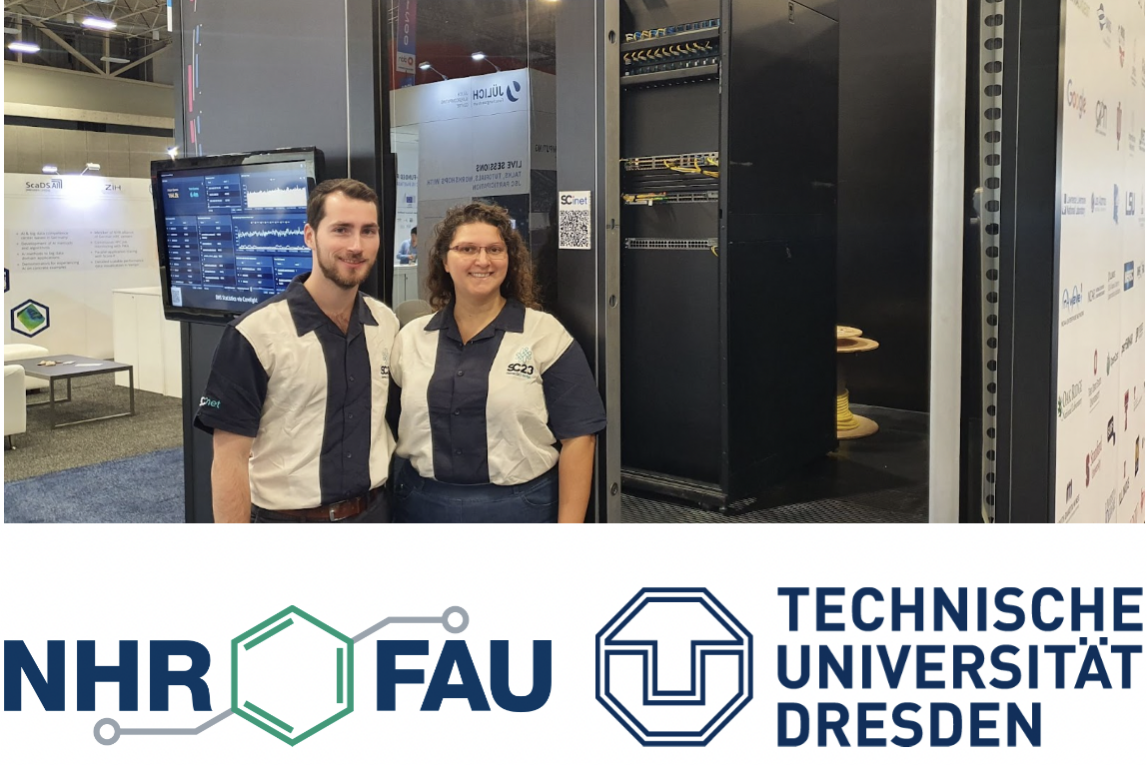NHR rocks SC
Anja Gerbes and Jan Laukemann from the National High Performance Computing Alliance (NHR) in Germany write about their experiences at SC22 in Dallas, TX.
The Supercomputing Conference, which took place in Nov 2022 in Dallas, TX, is not only a gathering of more than ten thousand individuals from cutting-edge HPC companies, researchers, and sales persons, but relies heavily on the help of volunteers to, for example, create a fascinating and high-quality technical program or build the world’s fastest network for the time being.
Especially on the latter, Anja Gerbes and Jan Laukemann from the National High Performance Computing Alliance (NHR) in Germany worked hard to make SC22 a success after two years of travel restrictions and limited access to in-person events. Anja is located in Dresden at the Center for Information Service and High Performance Computing (ZIH), TU Dresden (NHR@TUD), while Jan works for the Erlangen National High Performance Computing Center (NHR@FAU)and both not only share the fact, that they are currently working on their PhD degrees, but also have a long history of conference work together.
Anja and Jan’s SC conference journey
Anja’s HPC Conference journey began at ISC 2015, which had been held in Frankfurt am Main the first time. Everything began with her interest in HPC and Performance Analysis. Her mentor and PhD supervisor Prof. Julian Kunkel, GWDG, told her to submit for the Student Volunteer program at ISC-HPC Conference 2015 in Germany. The upcoming year, he advised her to apply for the Student Volunteer program at SC Conference 2016 in Salt Lake City as well. This turned out to be the start of a long journey, first as regular student volunteer (SC16), followed by several years up to now being part of SCinet, providing an unique and innovative network platform to the HPC community. At SC20 she took over additional responsibility in being SC Workshop and HiPar Workshop committee member, continuing in SC21 and SC22 as a SC Tutorial, HiPar Workshop as well as INDIS program committee member, just to take this another step further for SC21 and SC22, in which Anja became a lead student volunteer — valued leaders in the student program who work directly with committee members on a specific part of the conference. Facing the challenge of being SC Tutorial Vice Chair in 2023 makes her a perfect example of moving up the ladder in responsibility and leadership roles through hard work.
“I have had the passion in every minute I have contributed my time for SCinet and SC”, Anja says about her involvement in the conference. “I am looking forward to contributing to a successful SC23.”
Jan first got in touch with SC in Salt Lake City at SC16 as part of a student team in the Student Cluster Competition (SCC). In this 48-hour non-stop challenge undergraduates have to build, set up, and maintain their own cluster system and run benchmarks and real-life HPC applications in the most efficient way. He then participated as a regular student volunteer in 2017 and 2018, followed by being part of SCinet from SC19 on. This year, Anja and him were responsible for a distributed network operation center (DNOC) providing floor fiber connections to different exhibition booths on the show floor. Apart from volunteering, he has been taking part in the technical program as well with three different workshop papers and winning the best late-breaking paper award in the PMBS workshops 2019 and 2020. “SC heavily impacted my path in computer science and academia and brought me to where I am now”, he reflects, “I am excited about the next few years and hope SC will play an important role in them.”
NHR participation at SC
The NHR alliance showed its presence in manifold ways this year.
The NHR@FAU team “FRAUG” participated in the Student Cluster Competitionto win the HPCG challenge and score the second rank in the LINPACK category and were sponsored by MEGWARE. Other tasks were classic performance benchmarks like IO500, as well as real-life applications including PHASTA, LAMMPS, and SeisSol.
Furthermore, ZIH and TU Dresden welcomed exhibition attendees at their booth, where they showcased their tools for performance analysis, PIKA, Vampir, as well as their AI competence center ScaDS.AI.
Georg Hager, Gerhard Wellein, and Thomas Gruber from NHR@FAU performed their popular Node Level Performance Engineering tutorial, while Bert Wesarg and Frank Winkler from TU Dresden was involved in the Hands-On Practical Hybrid Parallel Application Performance Engineering tutorial. Christian Terboven from RWTH Aachen (NHR4CES) offered even two tutorials targeting OpenMP, more specifically Mastering Tasking with OpenMP and Advanced OpenMP: Host Performance and 5.2 Features.
About the Authors
 Anja Gerbes
Anja Gerbes
Anja works at the Center for Information Services and High Performance Computing (ZIH) at TU Dresden. She is responsible for the training held at ZIH and TU Dresden, as well as HPC resource management for NHR@TUD. This includes the conception, planning, and organization of the science-led assessment processes for computing time applications and the evaluation of the computing time requests from scientific user groups in cooperation with the scientific advisory board. Besides her day job she is doing her PhD in Performance Analysis and Compiler Optimization at DKRZ and GWDG, her supervisors are Prof. Dr. Thomas Ludwig and Prof. Dr. Julian Kunkel.
 Jan Laukemann
Jan Laukemann
Jan is a PhD student at Erlangen National High Performance Computing Center (NHR@FAU). Previously he finished his Master’s at the University of Erlangen-Nürnberg (FAU) and worked as a Research Scientist at Intel Parallel Computing Labs (Intel PCL). He works on application optimization and performance engineering for HPC systems and novel algorithms for scalable linear algebra, tensor decomposition and graph computations. His research interests primarily include x86 and non-x86 computer architectures, their performance behavior on the node level, and vectorization techniques. He is the main developer of the Open Source Architecture Code Analyzer (OSACA), a static in-core kernel analysis tool, and is part of the organization committee of the annual HPC-AI Advisory Council Student Cluster Competition at ISC High Performance.


1 Comment